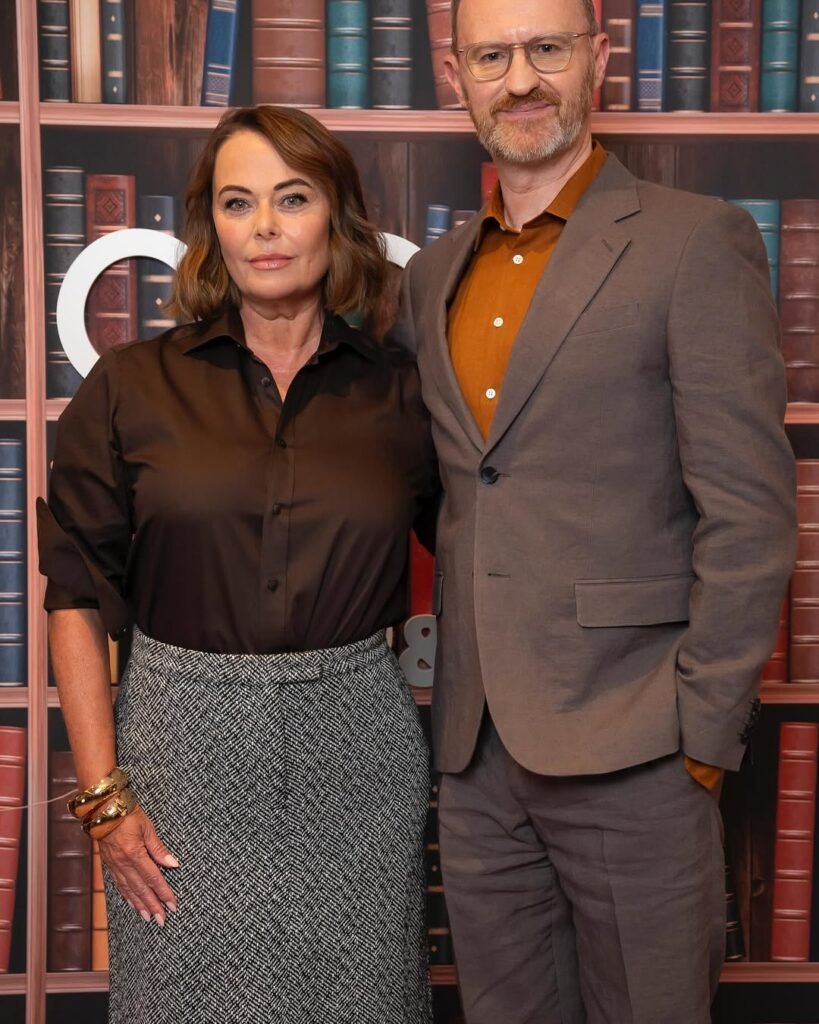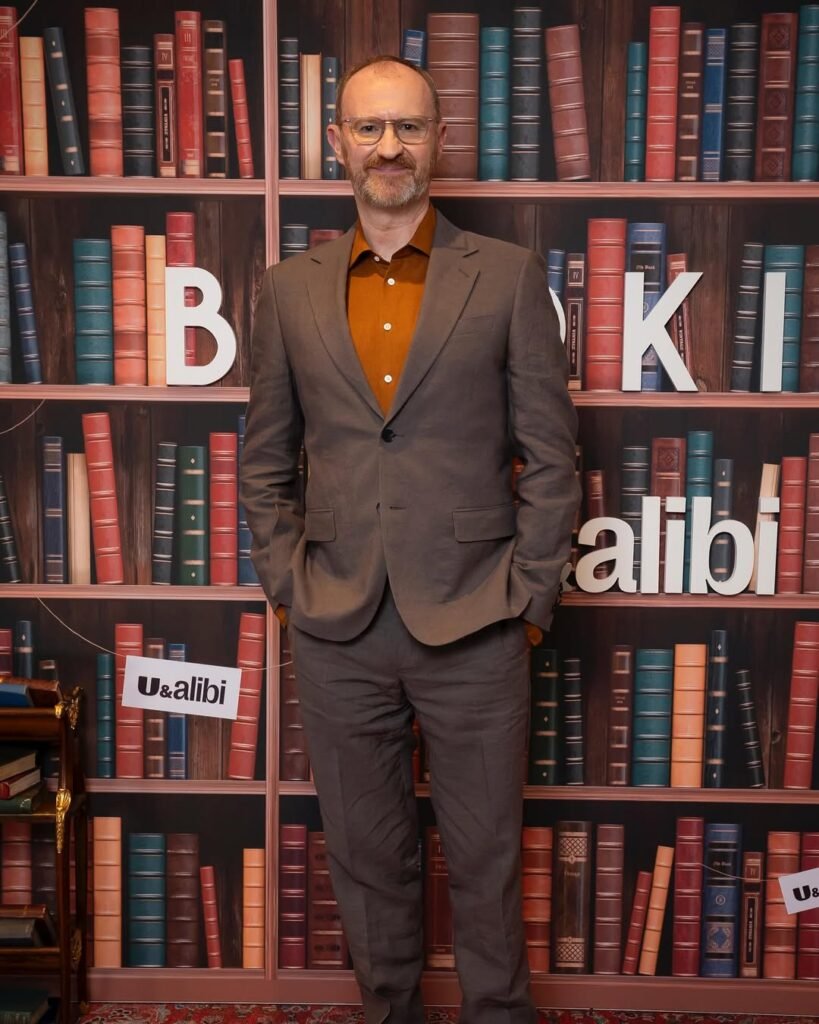Mark Gatiss stands as one of Britain’s most inventive and versatile creative forces. Over the last two decades, Gatiss has captured the public imagination as a writer, actor, director, and proud ambassador for British storytelling. This summer, with the debut of his much-anticipated series “Bookish” and appearances in major Hollywood blockbusters, he is once more at the forefront of the UK’s cultural conversation. From rural County Durham to the heart of London’s creative scene, Gatiss’s journey reflects both the vibrancy and resilience of British drama.
Bookish: A New Chapter for UK Crime Drama
This July, Mark Gatiss unveils “Bookish,” a detective drama set against the evocative backdrop of post-war London. Airing on U&Alibi, the series introduces Gabriel Book, a witty bookseller with a knack for helping the police solve perplexing cases. Viewers are drawn into a world where history, humour, and social change intersect.
Gatiss is more than the face of “Bookish”: he co-created and co-wrote the show, demonstrating his restless inventiveness. The series stands out for its complexity, mixing classic “whodunit” puzzles with incisive reflections on tolerance and identity in 1946 Britain. The main character, Gabriel Book, lives within a “lavender marriage,” highlighting the period’s criminalisation of homosexuality and the quiet struggles of many British people of the era. Gatiss describes the setting as “crucial,” believing that the post-war years were a turning point in both British cinema and society.
Reviews from leading UK outlets praise Gatiss’s new sleuth and the show’s atmospheric setting. While some comparisons to “Sherlock” are inevitable, there is consensus that “Bookish” carves its own niche, blending the suspense of golden-age detective stories with modern sensibilities and heart.
Craft and Influence: From Sherlock to Crime Mastermind
Gatiss is no stranger to reinventing the genre of British detective fiction. He is best known to millions for co-creating the hit BBC series “Sherlock,” which breathed new life into Sir Arthur Conan Doyle’s Victorian-era detective by transporting him to contemporary London. In “Sherlock,” Gatiss also played Mycroft Holmes, the equally brilliant and enigmatic brother to Benedict Cumberbatch’s Sherlock. The show earned international acclaim, scooping BAFTAs, Emmys, and a devoted following.
His fascination with puzzles, deduction, and the psychology of crime draws clear inspiration from luminaries like Agatha Christie and Dorothy L. Sayers. As Gatiss himself notes, true innovation within the detective genre requires finding “variations on familiar themes” while recognising what makes characters like Sherlock Holmes timeless. In interviews, he references classic stories such as “The Adventure of Silver Blaze” and discusses the thrill of achieving those “lightning bolt” moments of revelation that grip audiences.
Bridging Past and Present: Telling Unheard Stories
What sets Gatiss apart is his commitment to telling stories that reflect the depth and diversity of British life. “Bookish” investigates overlooked aspects of history, addressing the criminalisation of homosexuality in the 1940s and the resilience found in communities emerging from conflict. Gatiss believes exploring these themes brings fresh perspective not only to crime drama but also to the broader narrative of British identity.
He is keen to avoid treating the past as mere nostalgia. Instead, he weaves darker realities—trauma, loss, injustice—into stories that also offer optimism and warmth. This approach pervades his writing. As he explains, the allure of “cosy crime” should not obscure the hardship behind many true stories: “Crime can be deeply rooted in despair and sorrow,” he says, but also notes the enduring power of hope and humour in adversity.

Hollywood and the Global Stage
Gatiss’s career has never been confined to British television. This year, he appears in two major blockbusters: “Mission: Impossible – The Final Reckoning” and “Fantastic Four: First Steps.” His role as a 1960s talk-show host in the new Marvel film is emblematic of the frequent British contributions to expansive Hollywood franchises. While these forays may not carry the creative control of his TV projects, they underscore how British talent remains in demand around the world.
Despite his visibility, Gatiss remains grounded, shunning the trappings of Hollywood life and preferring the stimulating variety of UK projects. He still relishes working on home soil, involving himself in local theatre and championing the UK’s creative industries.
Leadership and Legacy
Behind the camera as well as in front of it, Gatiss strives to maintain a healthy, positive environment on set. He is well known for rejecting bullying or pretentiousness, insisting that everyone—cast and crew—feel respected and valued. Gatiss credits the creative atmosphere for allowing risks and new ideas to flourish. He draws lessons from his own experiences, recalling the dedication shared by colleagues on both sides of the Atlantic.
As a writer, Gatiss has repeatedly spoken about the state of British broadcasting and the precariousness of traditional television within the streaming era. He remains a firm advocate for nurturing British talent and preserving what makes UK drama distinctive. His comments reflect wider industry anxieties about the survival of homegrown content in the current marketplace.
Looking to the Future
With “Bookish” confirmed for a second series and new projects already on the horizon, Gatiss shows no sign of slowing down. He continues to push boundaries, delving into issues ranging from artificial intelligence in film to diverse forms of British storytelling. On stage, he recently captured critical acclaim as Sir John Gielgud in “The Motive and the Cue,” which brought him a second Olivier Award.
Championing Classic British Genres
Gatiss’s fascination with period stories and traditional British genres runs deep. He authored several acclaimed “Doctor Who” episodes, deftly weaving historic themes with contemporary social commentary. As a lifelong fan, he brought to the series a reverence for its legacy and an ability to revitalise classic storytelling for a new audience.
Conclusion:
Mark Gatiss’s enduring influence lies in his versatility and a determination to unearth Britain’s hidden histories, both dark and hopeful. Whether in the high-stakes world of TV drama, cinema, or theatre, he is a cultural touchstone who remains unafraid to challenge convention. As new chapters unfold—for Gatiss, for his characters, and for British culture—audiences in the UK and beyond can expect stories that both honour tradition and embrace the new.
Read More: Joanne Lees: Life rebuilt after the Outback tragedy

